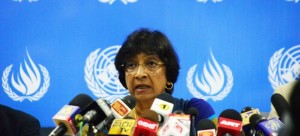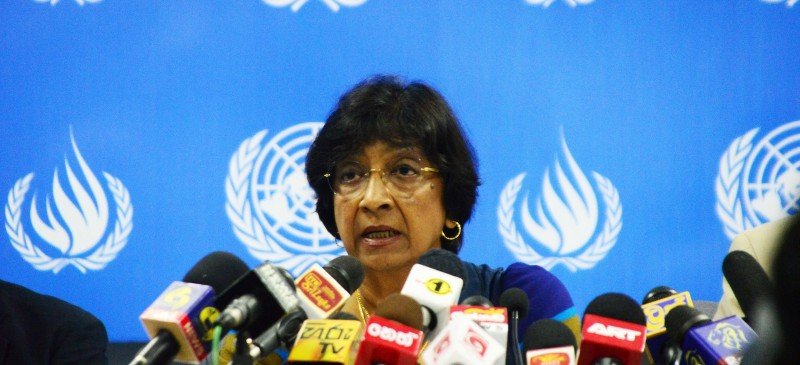 |
(GV)At the invitation of the Sri Lankan Government, UN High Commissioner for Human Rights Navi Pillay visited Sri Lanka at the end of August in what was, in her words, “the longest official visit I have ever made to a single country”.
Groundviews requested Selvaraj Rajasegar, a colleague at the Media Unit at the Centre for Policy Alternatives to, without going into too much of detail, assess the reportage around her visit and mission. This was done to test a hunch that mainstream Tamil language newspapers would be far more interested in Pillay’s visit than, in particular, the Sinhala language press or the English language press as well.
Pillay visited Jaffna and other places in the North of Sri Lanka on 27th August, meeting with citizens, civil society and political party representatives. Reportage of her visit the next day in the Tamil, Sinhala and English media is very revealing.
Tamil newspapers
| Name | Total news items | Lead News |
| Thinakkural | 9 | 7 Lead / 2 Photos |
| Sudar Oli | 9 | 8 Lead / 1 Photo |
| Virakesari | 6 | 6 Lead / 3 Photos |
| Thinakaran (State) | 14 | – |
Sinhala newspapers
| Name | Total news items | Lead News |
| Lankadeepa | 7 | 1 (1 Photos) |
| Lakbima | 13 | 1 Lead / 1 Photo |
| Divaina | 15 | 3 (1 Photo) |
| Dinamina (State) | 10 | – |
English newspapers
| News Paper | Total News | Lead News |
| Daily Mirror | 9 | 1 |
| Daily News | 10 | 1 Lead |
Aside from the obvious difference in the number of articles devoted to Pillay’s interactions in the North of Sri Lanka, Sinhala and Tamil State media simply blacked out this segment of her visit. Divaina, published by
Upali Newspapers Ltd and sister newspaper of The Island, was deeply critical of Pillay’s visit. One article quoted Transport Minister Kumara Welgama’s assertion that Pillay’s intervention in the domestic affairs of Sri Lanka was unacceptable. The other focussed on Pillay’s request to do away with the infamous Prevention of Terrorism Act (PTA), noting that the Government of Sri Lanka did not agree to this.
The Daily Mirror, owned by Wijeya Newspapers Ltd, published a single story around Pillay on the 28th, linked to the statement by senior Government minister Mervyn Silva to “marry” Pillay. In addition to reporting this news item, the Daily Mirror’s graphics desk had also conjured up a cartoon, depicting the Minister and Pillay (see high resolution image of the front page here). Not a single other article or story covering Pillay’s visit to the North of Sri Lanka was carried on the front page. At the top of the front page, linking to page A9 is an article titled ‘Morality of Navi Pillay’s Visit’. This article was written by the JHU’s Udaya Gammanpila, and was specifically condemned by Pillay in her end of mission statement and forcing even the President of Sri Lanka to apologise.
The State owned Daily News published on its front page an article critical of Pillay, covering the President’s visit to Belarus and calling the UN Human Rights Council (HRC) an “anti-Lankan catspaw“.
Rajesh also looked at the coverage of Pillay’s mission to Sri Lanka from 28th August to 1st September, in other words, her mission to Sri Lanka after her visit to the North, including her end of mission press conference.
Tamil newspapers (Private)
| News Paper | Total News (Related) | Lead News | Photos | Editorial |
| Thinakkural | 27 | 5 | 10 | 2 |
| Sudar Oli | 35 | 5 | 4 | 2 |
| Virakesari | 27 | 5 | 13 | 4 |
| Total | 89 | 15 | 27 | 8 |
Sinhala newspapers (Private)
| News Paper | Total News (Related) | Lead News | Photos | Editorial |
| Lankadeepa | 11 | 6 | ||
| Lakbima | 11 | 3 | 6 | |
| Divaina | 14 | 6 | 1 | |
| Total | 36 | 3 | 18 | 1 |
English newspapers (Private)
| News Paper | Total News (Related) | Lead News) | Photos | Editorial |
| Daily Mirror | 12 | 5 | 1 |
State owned newspapers
| News Paper | Total News (Related) | Lead News | Photos | Editorial |
| Dinamina | 5 | 1 | 1 | 2 |
| Silumina | 1 | 1 | ||
| Thinakaran | 9 | 2 | 3 | 1 |
| Daily News | 4 | 2 | 1 | 2 |
| Total | 19 | 5 | 6 | 5 |
The difference between State and Private print media coverage, and the difference between Tamil language coverage vs. Sinhala and English is evident. In what was one of the most important missions to Sri Lanka by any UN official in recent times, regarding issues deeply relevant to not just the Government’s own LLRC National Action Plan, but sustained scrutiny of Sri Lanka’s democratic deficit and human rights record at the UN Human Rights Council and other international fora, the Sinhala and English language media quite simply failed to inform the public.
Groundviews was repeatedly told that mainstream media were pressured to underplay coverage of Pillay’s visit.
The end result is that citizens who rely on mainstream media in Sri Lanka to inform them – who largely don’t read Groundviews, don’t access Colombo Telegraph and don’t know of Vikalpa – are both ill-informed and mis-informed about Pillay’s visit. This has enduring effects, like for example the ability of Sri Lanka’s Foreign Minister to openly lie about UN statistics when rebutting Pillay’s statements, in full knowledge that the mainstream media won’t question him on this, and that facts are secondary to polemics.
